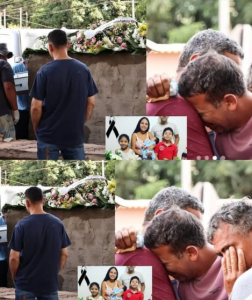Father Needed Support During the Darkest Chapter of His Life
The house was quiet that evening, too quiet for a place that once echoed with laughter. Mark sat at the edge of his bed, his hands trembling slightly, his eyes locked on the framed photo of his late wife on the nightstand. Life had always been unpredictable, but nothing could have prepared him for losing her so suddenly. In the months that followed, every corner of the house whispered memories he wasn’t ready to face.
He tried to keep strong, especially for the children. Emma was nine and Jacob just six. They didn’t fully understand what had happened; all they knew was that Mommy wasn’t coming home. Mark, now both father and mother, tried to juggle it all—school runs, grocery shopping, bedtime stories, bills, work. Each day bled into the next, and the weight of his new reality began to suffocate him.
He returned to work two weeks after the funeral, but his mind wasn’t there. Deadlines were missed, calls ignored. His boss showed sympathy at first but soon warned that patience had limits. Mark didn’t blame him. He wasn’t the same. He was sleep-deprived, emotionally raw, and functioning on autopilot.
Family offered help—meals, babysitting, check-in calls—but Mark turned most of it down. Pride, or maybe fear of seeming weak, kept him from accepting too much. He believed he had to do it alone. He was the father. He had to hold it together.
But one night, everything cracked. Jacob had a fever. Emma was crying about a forgotten school project. The sink was leaking. Mark sat on the kitchen floor, exhausted beyond words, tears streaming silently down his face. That’s when his sister, Laura, walked in unannounced. She saw the chaos—the dishes, the children, her brother’s pale face—and said nothing at first. Then she knelt beside him and wrapped him in a hug.
“You don’t have to do this alone,” she whispered.
Those simple words broke the dam. For the first time, Mark allowed himself to grieve openly. To admit he needed help. That he wasn’t okay. Laura stayed that night. The next day, she arranged a meal schedule with neighbors. Her husband fixed the sink. Her teenage son offered to help with tutoring Emma. Slowly, a community started forming around Mark, one he hadn’t realized he needed.
Support also came from unexpected places. Emma’s teacher began sending encouraging notes home. A co-worker who had lost his wife years earlier offered a listening ear. The local church organized a kids’ day out, giving Mark a rare moment to breathe. These acts, though small, formed a lifeline.
Mark began seeing a grief counselor. The sessions were difficult at first—filled with guilt, sadness, anger—but they also brought clarity. He learned that asking for help was not a weakness but a necessary step toward healing. He realized he didn’t have to be perfect, just present.
He started talking more with the kids, not just about homework or routines, but about their feelings. They shared stories about their mom, laughed at funny memories, and cried when the ache grew too heavy. They created new rituals—Saturday pancakes, memory boxes, garden planting days—to keep her spirit alive while also moving forward.
In time, the house began to feel less hollow. The silence turned into music, laughter, conversation. There were still hard days—anniversaries, birthdays, sudden waves of grief—but they faced them together.
The journey was long and messy, but through it, Mark learned something profound: even the strongest need support. And true strength is often found in vulnerability, in the willingness to say, “I can’t do this alone.”
He would later tell other widowed fathers his story. At support groups, in online forums, at school events. He encouraged others to reach out, to accept help, to lean on others when the burden became too much. His experience became more than pain—it became purpose.
One evening, two years after his wife’s passing, Mark stood in the kitchen flipping pancakes with Jacob while Emma set the table. The house felt alive again. It wasn’t the same, and it never would be, but it was whole in a new way.
He glanced out the window, where a gentle breeze moved the wind chime his wife had hung years ago. It rang softly, like a whisper, like a reminder that love doesn’t vanish—it changes form, moves with you, guides you forward.
Mark smiled, knowing that though he had once walked through the valley of despair, he didn’t walk it alone. And because of that, he and his children had found light again.

